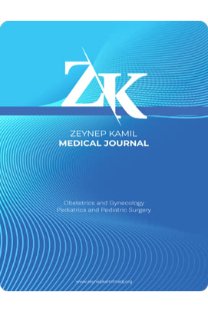Gebelikteki beden imajının emzirme tutumu ve doğum sonu emzirme sürecine etkisi
gebelik, beden imajı, emzirme tutumu, doğum sonu emzirme süreci
Breastfeeding attitude of body image in pregnancy and effect on breastfeeding process
___
- World Health Organization (WHO) Infant and young child feding. Fact sheet Updated July 2017 http://www.who.int/mediacentre/factsheets/fs342/en/
- Türkiye Nüfus ve Sağlık Araştırması Hacettepe Üniversitesi Nüfus Etütleri Enstitüsü Ankara, 2013.
- Brown A, Ranje J, Warren L. Body image concerns during pregnancy are associated with a shorter breast feeding duration. Midwifery. 2015;31:80–9. Huang HC, Wang SY, Chen CH. Body image, maternal-fetal attachment, and choice of infant feeding method: a study in Taiwan. BIRTH 2004;31(3):5-12.
- Yanıkkerem E, Ay S, Göker A. Primipar ve Multipar Gebelerin Emzirme Tutumu ve Yaşadıklar ı Endişeler. Van Tıp Dergisi. 2014;21(1):6-16.
- Clark A, Skouteris H, Wertheim EH, Paxton SJ, Milgrom J. My baby body: A qualitative insight into women’s body-related experiences and mood during pregnancy and the postpartum. J Reprod Infant Psychol. 2009;27(4):330–45.
- Kamysheva E, Skouteris H, Wertheim EH, Paxton SJ, Milgrom J. Examination of a multi-factorial model of body-related experiences during pregnancy: The relationships among physical symptoms, sleep quality, depression, self-esteem, and negative body attitudes. Body Image. 2008;5:152–63.
- Hauff LE, Demerath EW. Body ımage concerns and reduced breastfeeding duration in primiparous overweight and obese women. Am J Hum Biol. 2012;24: 339-49.
- Loth KA, Bauer KW, Wall M, Berge J, Neumark-Sztainer D. Body satisfaction during pregnancy. Body Image. 2011; 8(3): 297–300.
- Barnes J, Stein A, Smith T, Pollock JI. Extreme attitudes to body shape, social and psychological factors and a reluctance to breast feed. J R Soc Med. 1997;90:551-559.
- Foster SF, Slade P, Wilson K. Body ımage, maternal fetal attachment and breast feedıng. J Psychosom Res. 1996;41(2):181-4.
- World Health Organization (WHO) Body mass index – BMI. http://www.euro.who.int/en/health-topics/disease-prevention/nutrition/a-healthy-lifestyle/body-mass-index-bmi
- Arslan H. Emzirme Tutumunu Değerlendirme Ölçeği Geliştirme, Hemşirelik Forumu. 1999;2(3):132-6.
- Winstead BA, Cash TF. Reliability and Validity of the Body-Self Questionnaire: A New Measure of Body Image. Paper presented at the meeting of the Southeastern Psychological Association, New Orleans, Louisiana. 1984, March 19-21.
- Doğan O, Doğan S. Çok yönlü beden-self ilişkileri ölçeği el kitabı. Sivas Cumhuriyet Üniversitesi Yayınları.1992:8-29.
- Skouteris H, Carr R, Wertheim EH, Paxton SJ, Duncombe D. A prospective study of factors that lead to body dissatisfaction during pregnancy. Body Image. 2005;2:347–61.
- Harris M. Is love seen as different for the obese? J Appl Soc Psychol. 1990;20:1209–24.
- Larsson G, Andersson-Ellstrom A. Experiences of pregnancy-related body shape changes and of breast-feeding in women with a history of eating disorders. Eur Eat Disord Rev. 2003;11:116–24.
- Rojjanasrirat W, Sousa VD. Perceptions of breastfeeding and planned return to work or school among low income pregnant women in the USA. J Clin Nurs. 2010;19:2014–22.
- Hughes R. Satisfaction with one’s body and success in breastfeeding. Issues Compr Pediatr Nurs. 1984:141–53.
- ISSN: 1300-7971
- Yayın Aralığı: 4
- Başlangıç: 1969
- Yayıncı: Ali Cangül
Sibel Sak, Emin Taşdüzen, Güler Çakmak, Nurullah Peker, Talip Karaçor, Muhammet Erdal Sak
ÇOCUK HASTADA NADİR BİR GÖĞÜS AĞRISI NEDENİ: SPONTAN PNÖMOMEDİASTİNUM
Abdullah Yazar, Esra Türe, Fatih Akın, Sevgi Pekcan, Dursun Odabaş
Trizomi 8 mosaisizmi: Bir Olgu Sunumu
ARDA ÇETİNKAYA, Mehmet Burak MUTLU, Selin KARAMAN, Hatip AYDIN, Cem Murat KIZILDELİ, ALİ KARAMAN
4500 gram ve üstü fetusların maternal ve fetal sonuçları: tek merkez deneyimi
Karot Operatörü Olarak Çalışan Erkek Bireylerin Üreme Sağlığı Durumları Hakkında Bir Araştırma
Savaş KANBUR, Ali Kemal EYÜBOĞLU
Ailevi Akdeniz Ateşi Olan 40 Gebenin Perinatal Sonuçları
Ebru Alici DAVUTOGLU, Ayşegül ÖZEL, HAKAN ERENEL, Rıza MADAZLI
YASEMİN AYDIN KARTAL, Cansu IŞIK BENLİ, SAADET YAZICI
Prematüre İnfantlarda Uzamış Kardiyopulmoner Resusitasyondan Sonra Gelişen Hava Embolisi
ELİF ÖZALKAYA, Güner KARARTEKİN, Sevilay TOPÇUOĞLU, Abdulhamit TUTEN, Tülin GÖKMEN
Çiğdem YAYLA ABİDE, İlter YENİDEDE, ENİS ÖZKAYA
Yenidoğan ve Süt Çocuklarında Girişimsel Ağrı ve Non-farmakolojik Yönetimi
